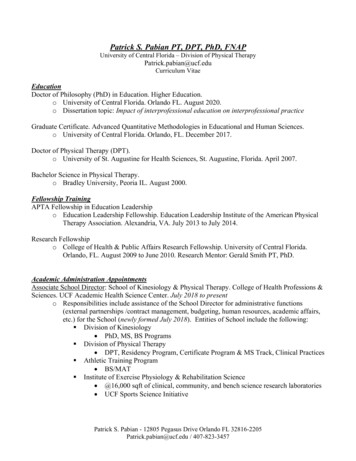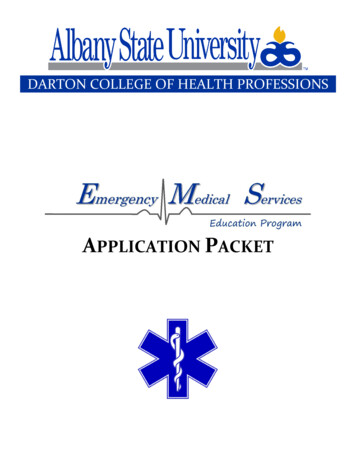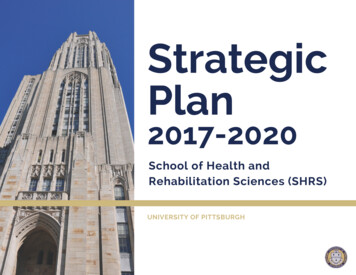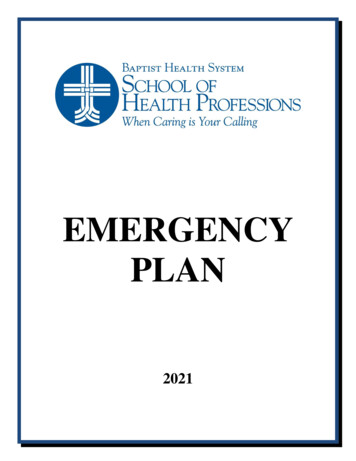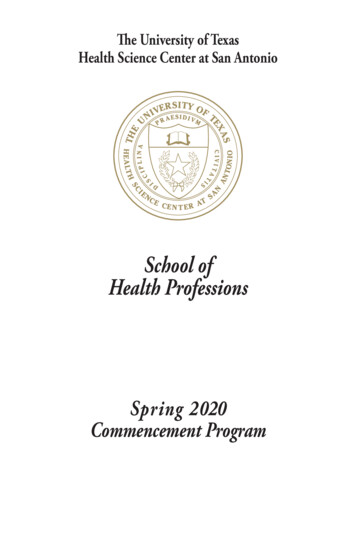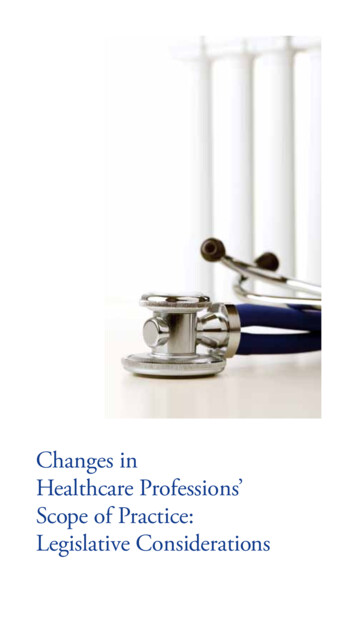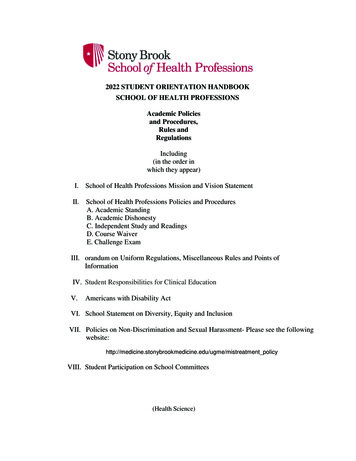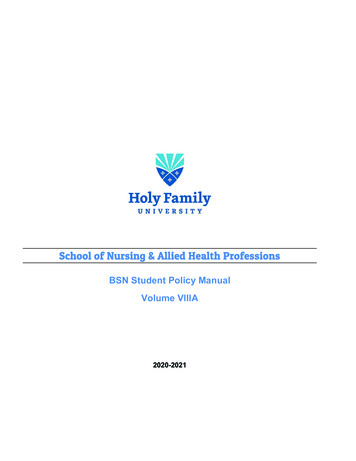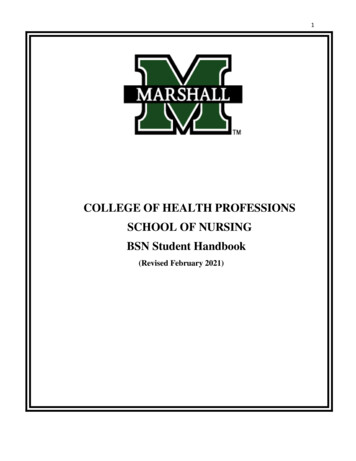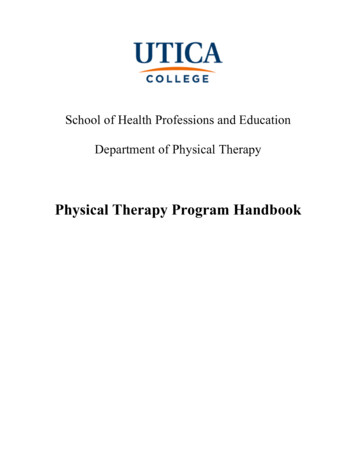
Transcription
School of Health Professions and EducationDepartment of Physical TherapyPhysical Therapy Program Handbook
Table of ContentsPURPOSE . 3MISSION AND PHILOSOPHY . 3STUDENT LEARNING GOALS . 4ACCREDITATION STATUS. 4THE PHYSICAL THERAPY CURRICULUM . 5DISCLAIMER . 5PROGRAM DIRECTORY . 6ACADEMIC PROGRESS & CONTINUATION REQUIREMENTS . 8GRADING STANDARDS . 8PROGRAM EXPECTATIONS . 9ESSENTIAL FUNCTIONS . 9PROFESSIONAL BEHAVIORS . 10CODE OF STUDENT CONDUCT . 10CONFIDENTIALITY STATEMENT FOR STUDENTS. 10SOCIAL MEDIA POLICY . 11MAKE-UP EXAMINATIONS . 11COPYRIGHTED MATERIAL AND UNAUTHORIZED PEER-TO-PEER FILE SHARING . 11ATTENDANCE AND PARTICIPATION . 12LEAVE OF ABSENCE . 12DISMISSAL FROM THE PROGRAM . 13SUMMARY DISMISSAL . 13MISCELLANEOUS INFORMATION . 14GUIDELINES FOR LABORATORIES . 14ADVISOR/ADVISEE ROLES AND FUNCTIONS . 14ACADEMIC ACCOMMODATIONS . 15PROFESSIONAL ORGANIZATIONS . 15APPENDIX A: SEQUENCE OF COURSES . 16APPENDIX B: ESSENTIAL FUNCTIONS OF A PHYSICAL THERAPY STUDENT. 17APPENDIX C: PROFESSIONAL EXPECTATIONS . 19APPENDIX D: ATTENDANCE AND PARTICIPATION POLICY . 20APPENDIX E: MEDICAL CLEARANCE FORM . 22Updated March 20192
PURPOSEThe Physical Therapy Program’s Chair, faculty and staff would like to welcome you to the professionalphase of the Physical Therapy Program at Utica College. The College offers a unique blend of liberalstudies and professional education experiences. Students are encouraged to take full advantage of thevariety of learning opportunities available while pursuing the educational goal of becoming physicaltherapists.This handbook is designed to serve as the guide for students enrolled in the Doctor of Physical TherapyProgram at Utica College. The contents of the handbook represent an official communication of thepolicies and procedures of the Physical Therapy Program. These policies and procedures are designed foryour success. The information in this handbook has been chosen with two additional purposes in mind.First, an informed student is a prepared learner. An understanding of the goals and mission of theProgram helps to integrate individual course material into an overall view of the profession of physicaltherapy. Second, we take seriously the commitment of providing a quality education that preparesstudents to function as future doctors of physical therapy. The student is expected to be accountable,taking responsibility for one’s learning and progression throughout the Program. This handbook providesthe information necessary for students to take that responsibility.The Physical Therapy Program Handbook is to be used together with: 1) the Clinical Education Manual,2) the Utica College Graduate Catalog, 3) and the Utica College Undergraduate Catalog, 4) the UticaCollege Student Handbook1. It is the responsibility of each student to read and understand their contents.Failure to comply with the rules and regulations contained within these resources may result indisciplinary action that includes, but is not limited to, dismissal from the Program and/or the College.MISSION AND PHILOSOPHYThe mission of the Utica College Physical Therapy Program is to “educate students to become doctors ofphysical therapy who embrace the honor of their responsibility as professionals. Our faculty, students andgraduates will demonstrate behaviors consistent with the mission of Utica College and the Core Values ofthe American Physical Therapy Association.”Utica College educates students for rewarding careers, responsible citizenship, and fulfilling lives byintegrating liberal and professional study, by creating a community of learners with diverse experiencesand perspectives, by balancing its local heritage with a global perspective, by encouraging lifelonglearning, and by promoting scholarship in the belief that the discovery and application of knowledgeenrich teaching and learning.Utica College’s graduate programs prepare professionals to meet the present and future challenges posedby the increasing complexity of our global society and to assume the leadership roles necessary to guidetheir organizations through the ever-changing information and technology age.Graduate education at Utica College shares the undergraduate mission of liberal, professional, andspecialized study by addressing a wide range of human issues, while focusing on the acquisition ofknowledge in the context of a profession. The Utica College graduate programs are committed topreparing well-educated men and women, who have developed the necessary competencies for theircareers, and who are responsive and sensitive to the needs of the communities in which they reside, study,and work. (Utica College Graduate Catalog).The Program exemplifies the mission of the College by integrating liberal studies education inundergraduate, pre-professional studies with professional, graduate education. The Program is dedicatedto fostering self-direction in lifelong learning and professional development and producing responsible1Can be found at: https://www.utica.edu/academic/catalog/Updated March 20193
citizens who embody the values fundamental to the College’s liberal arts foundation. The consensus ofthe faculty in the physical therapy program is that the DPT is the degree most commensurate with theexpected level of knowledge, skills and behaviors necessary for a clinician practicing physical therapy inthe current health care climate.STUDENT LEARNING GOALSGraduates from the Utica College Physical Therapy Program will:I. Demonstrate current standards of physical therapist practice as skilled professionals withsound reasoning skills and capability for incorporating evidence into practice. The UticaCollege Physical Therapy Program students will demonstrate:- the knowledge to provide comprehensive patient/client management across thelifespan and in a variety of practice settings;- the skills to provide comprehensive patient/client management across the lifespan andin a variety of practice settings;- the knowledge and skills necessary for professional practice administration; and- sound clinical reasoning skills that are based on the best available evidence.II. Demonstrate entry-level professional behaviors. The Utica College Physical TherapyProgram student will demonstrate:- professional behaviors consistent with entry-level practice; and- responsible behaviors toward society consistent with Utica College’s Mission andAPTA’s Core Values.ACCREDITATION STATUSUtica College is chartered by the Regents of The University of the State of New York. The College isaccredited by the Commission on Higher Education of the Middle States Association of Colleges andSchools, 3624 Market Street, Philadelphia, PA, 19104-2680, (215) 662-5606. The Commission on HigherEducation is an institutional accrediting agency recognized by the U.S. Secretary of Education and theCommission on Recognition of Postsecondary Accreditation. The College’s Graduate Programs areapproved by the New York State Education Department, Office of Higher Education, Room 979 EBA, 89Washington Ave., Albany, New York 12234, (518) 474-5851.The entry level DPT Program at Utica College is accredited through 2023 by the Commission onAccreditation in Physical Therapy Education (CAPTE), 1111 North Fairfax Street, Alexandria, Virginia22314; telephone: 703-706-3245; email: accreditation@apta.org; website: http://www.capte.online.org.Graduates are eligible for the National Physical Therapy Examination (NPTE) and licensure in all states.Students are not allowed to sit for the NPTE until all program requirements have been met.Notice of ComplianceUtica College is an equal opportunity, affirmative action institution, and accepts students and employsindividuals without regard to race, creed, color, sex, pregnancy, ethnic or national origin, religion, maritalstatus, age, sexual orientation, gender identity, gender expression, veteran status, disability, citizenshipstatus, genetic predisposition, domestic violence victim status, or protected status under applicable local,state, or federal law. This nondiscrimination policy covers admissions, employment, and access to andtreatment in Utica College programs, services, and activities.The Physical Therapy Program adheres to the equal opportunity statement in every aspect of studentrecruitment, admission, and retention. It is Utica College policy to admit students who can benefit fromUpdated March 20194
the educational opportunities offered and whom the College has the capabilities to serve. Students areadmitted on the basis of their potential for intellectual, social, personal, and professional growth.Gaining admission into, or continuation in the professional Physical Therapy Program requires thatstudents exhibit behaviors appropriate to practice expectations. Evidence of moral turpitude, inappropriatebehavior, failure to abide by the Student Code of Conduct, failure to abide by the relevant profession'scode of conduct, or other acts deemed unbecoming of a profession will result in denial of entry into ordenial of continuation in the Physical Therapy Program.Utica College welcomes the physically challenged and in compliance with Section 504 of theRehabilitation Act of 1973 (as amended) and The Americans with Disability Act of 1990 (ADA), doesnot discriminate on the basis of handicap. Students are responsible for informing the faculty of any needfor accommodations as identified by the coordinator of Learning Services, located in Academic SupportServices.THE PHYSICAL THERAPY CURRICULUMThe curriculum was created to enhance the educational experience for students and lead to improvedprogram outcomes. The curriculum integrates traditional instruction with case analysis to guide,stimulate, and challenge student learning, while fostering development as professionals with soundreasoning skills. The capstone projects, under faculty supervision, provide opportunities for students tomeet the profession’s expectation to become consumers of research. A progression of critical inquiry andevidence based practice will result in case reports or systematic reviews.Students participate in a minimum of 30 weeks of full-time clinical education experiences in a variety ofsettings, working with individuals across the lifespan. The first clinical education experience occursduring the second summer semester for six weeks. The final two full time clinical education experiencesoccur during the year 3 fall and spring semesters for 12-16 weeks each. In addition, four integratedclinical experiences take place during the academic semesters and provide experiential learning incommunity settings with emphasis on prevention and wellness throughout the first two years of thedoctoral program. The curriculum outline and list of courses are available on the Utica College websiteunder Curriculum and Courses or review the sequence of courses here (Appendix A).Pending successful completion of all Program requirements, students will graduate with the Doctor ofPhysical Therapy degree in the spring semester of the third year.DISCLAIMERThe Utica College Physical Therapy Program reserves the right to change the policies, procedures,rules, regulations, and information in this handbook and the accompanying Clinical Education Manual atany time. Changes will become effective at the time the Program so determine and the changes will applyto both prospective students and those already enrolled. This handbook is a general informationpublication only, and it is not intended to nor does it contain all regulations that relate to students.Updated March 20195
PROGRAM DIRECTORYProgram ChairAshraf Elazzazi, PT, PhDProfessor(315) 792-3313aelazzazi@utica.edurm. 222A White HallThomas Crist, PhDProfessor(315) 792-3390tcrist@utica.edurm. 304 Romano HallAshraf Elmarakby, PT, PhDAssistant Professor(315) 223-2547aselmara@utica.edurm. 303 Romano HallDawn Evans, PT, DPTProfessor of Practice(315) 223-2570devans@utica.edurm. 310 Romano HallMolly Hickey, PT, DPTAssociate Professor(315) 792- 3089mahickey@utica.edurm. 204 Romano HallGabriele Moriello, PT, PhDAssociate Professor(315) 792-3261grmoriel@utica.edurm. 313 Romano HallAhmed Radwan, PT, DPT, PhDAssociate Professor(315) 792-3853aradwan@utica.edurm. 113 DePerno HallDavid Schilling, PT, DPT, OCSAssistant Professor(315) 223-2561dtschilling@utica.edurm. 203 Romano HallJim Smith, PT, DPT, MAProfessor(315) 792-3074jsmith@utica.edurm. 305 Romano Hall(315) 223-4534mtnunnoe@utica.edurm. 225 White HallBrittany Simpson PT, DPT(315) 792-3533Professor of Practice, Assistant DCE. wola6062@utica.edurm. 229 White HallCore FacultyClinical Education FacultyShelly Nunno-Evans, PT, DPTAssist. Professor, DCELab DirectorsRichard Panetta, PT, DPT(315) 792-3317rpanett@utica.edurm. 223 White HallCarrie Caruso-Rahn(315) 792-3549cacaruso@utica.edurm. 220 White HallAssociated and Adjunct FacultyJan Simpson, PT, DPT, MSAssistant Professor(315) 792-3308jsimpson@utica.edurm. 225 White HallOther adjunct faculty are listed on course syllabi with preferred contact information. General messagescan be left for any of the faulty by calling the School of Health Professions and Education at (315) 7923075Updated March 20196
School of Health Professions and EducationOffice: 230 White HallInterim Dean of the School of Health Professions and EducationPatrice Hallock, PhD(315) 792-3738Administrative AssistantsMeeNah Pelland, (Office Manager)Christina Poplaski Administrative Assistant IIShelly LoGalbo, Administrative Assistant IILorraine Mayhew, Clinical Education SecretaryUpdated March 2019(315) 792-3059(315) 792-3452(315) 792-3090(315) 792-31597
ACADEMIC PROGRESS & CONTINUATION REQUIREMENTSIn addition to the Academic Policies and Procedures outlined in the current UC Graduate Catalog andregardless of graduate or undergraduate status, students enrolled in the professional program are subjectto the Program’s rules and regulations and must:- adhere to all Utica College policies;- achieve a grade of C or better in all professional courses (DPT designation);- a letter of warning will be issued and probationary period will begin for any student who receivesa grade of C or C in any of the DPT courses;- a letter of dismissal will be issued to any student who earns a grade of C- or less;- a letter of dismissal will be issued to any student who earn more than two grades below B- inprofessional courses (DPT designation);- maintain a cumulative GPA of 3.0 each semester after having completed 18 DPT credit hours,- a letter of warning will be issued and probationary period will begin for any student who has aGPA less than 3.0 before completing 18 credit hours in DPT courses;- a letter of dismissal will be issued to any student who has a GPA of less than 3.0 after havingcompleted 18 (eighteen) credit hours;- adhere to the established sequence of courses (Appendix A); and- complete each clinical education course with a grade of Pass2.- All requirements for graduate degree programs must be completed within six years of the initial dateof matriculation in the program. Failure to observe the six-year limitation shall result in dismissalfrom the program.Undergraduate students in the 500 level of the Physical Therapy Program are held to graduate levelacademic standards, consistent with the accelerated nature of the program. Students in the 500 level ofthese programs who fail to progress will be reassigned to a Health Studies advisor with the option tocomplete degree requirements for the bachelor’s degree in Health Sciences or another bachelor’s degreewithin the College.Grading StandardsStudents enrolled in the first year of the professional program include those with undergraduate as well asgraduate status. For undergraduate students, the institutional grading scale includes letter grades from Athrough F and Pass. Once a student becomes a graduate student, the only available grades range from Athrough C and Pass. To continue enrollment in the DPT courses, students must earn a grade of C or betterin each required DPT course in order to continue in the Program. The Grading scale3 for graduate coursesis as follows:Graduate Grading ScaleA94 - 100A90 - 93.99B 87 - 89.99B84 - 86.99BC CF80 - 83.9977 - 79.9974 - 76.990-73.99Undergraduate students who are enrolled in the first year of the DPT Program and earn a grade less thanC will be dismissed from the Program only, not the College. In this situation, the student’s major will23Consequence of unsatisfactory performance on a clinical education is detailed in the Clinical Education Manual.All clinical education experiences are graded on a Pass/Fail basis.Updated March 20198
change from Health Studies PT-Track (HSPT) to Health Studies (HS) with the option to complete thedegree requirements for the bachelor’s degree in Health Studies. The student is responsible for reviewinghis/her remaining academic requirements needed to complete the undergraduate Health Studies degree.The grading scale for the completion of undergraduate degree is as follows:Undergraduate Grading ScaleA94 - 100A90 - 93.99B 87 - 89.99B84 - 86.99B80 - 83.99C 77 - 79.99CCD DF74 - 76.9970 - 73.9967 - 69.9960 - 66.990 - 59.99A grade of Incomplete (I) may be granted only under extenuating circumstances. A student may request,or an instructor can offer, an (I) grade if exceptional circumstances warrant it, but the decision isultimately at the discretion of the instructor. A grade of Incomplete must be agreed upon by both thestudent and the instructor and should include the completion of an Incomplete Contract Form. Theamount of time granted to complete the Incomplete will be set by the instructor at the time the grade issubmitted, but the default time frame is six weeks from the latest final grades due date of a givensemester.Grade AppealsThe instructor is the final authority for all grading/scoring. If you feel that the grade/score assigned to youfor an examination or assignment is incorrect, you may petition to have your grade considered foradjustment. This requires that you submit, within one week of grade posting and in writing, anexplanation or evidence as to why your answer is correct or deserves re-evaluation. References thatsupport your conclusion are encouraged.Course Grade ChangesPolicy: Once a grade has been reported, it may not be changed except to correct an error. All such casesmust be reported by the course instructor and require the approval of the academic school dean. If astudent believes that the grade reported by the course instructor is not accurate and after talking with theinstructor still believes there is an error, the student may petition the Academic Standards Committee fora grade change.Procedure: The only valid reason to change a grade previously submitted is computational error orclerical (data entry) error. The grade change request may be submitted on a paper card available in theAcademic School Offices or by using an online form available on the Registrar’s Office website ange.cfm.PROGRAM EXPECTATIONSAll students are required to comply with the Physical Therapy Program and College requirements. Theserules are found in the Utica College Undergraduate Catalog, The Utica College Student Handbook, TheUtica College Graduate Catalog, and the Physical Therapy Program Handbook. Success in the physicaltherapy curriculum requires that a student demonstrate the knowledge, skills and professional behaviorsexpected of an entry-level physical therapist.Essential FunctionsA physical therapist must demonstrate the knowledge (cognitive), skills (psychomotor) and professionalbehaviors (affective) to function in a broad variety of clinical situations and to render a wide spectrum ofpatient care. The abilities that a physical therapist must possess to practice safely are clearly described inUpdated March 20199
the appended item entitled “Essential Functions of Physical Therapy Students” (Appendix B). Thepurpose of this document is to delineate the cognitive, psychomotor and affective skills deemed essentialfor completion of this program and to perform as a competent physical therapist.Professional BehaviorsIn addition to the required core of knowledge and skills, it has been recognized by educators andpracticing professionals that a repertoire of behaviors is required for success in any given profession.Professional behaviors are assessed throughout the program by using tools that has been developed toidentify and describe this repertoire of behaviors. By using these instrument, the development ofprofessional attributes in physical therapy students can be facilitated.Recognizing that students enter the professional program with varying levels of ability in the area ofprofessional behaviors, progressive levels of expectations have been identified by the program. Each levelbuilds on the previous level, representing growth over time. This transformation is witnessed as students’progress through the program. Formal opportunities to reflect and discuss the learner’s developmentcritical to the expected outcome of this process are delineated in designated courses and is discussedregularly with faculty advisors.Knowledge and skills are examined in more traditional formats including written assessment and practicalobservation, while professional behaviors are assessed using the APTA” Core Values, and the ClinicalPerformance Instrument (Appendix C)Code of Student ConductUtica College is a community committed to the principles of civility and fairness in pursuit of apurposeful academic experience. Students, staff, and faculty can expect that every interaction will begoverned by the Utica College values and APTA Core Values. The Code of Student Conduct articulatesthe connection between student behavior and these norms and expectations of the college community.Each student is responsible for his/her conduct from admission to Utica College to graduation. Studentsare expected to know and uphold the Code of Student Conduct, as well as abide by local, state, andfederal law. When the Code is not upheld, students will face action through the conduct process. Thecomplete Code of Student Conduct is available online at www.utica.edu/student/conduct.Confidentiality Statement for StudentsConfidentiality is a critical element to a professional health care provider and compliance is required bylaw in order to protect the privacy rights of patients. The Health Insurance Portability and AccountabilityAct of 1996 (HIPAA) mandates standards that ensure privacy and security of patients’ health information,as well as electronic medical records. Students are required to know these privacy rules and will complyat all times.Students may be granted access to protected health information (PHI) of patients on a “need to know”basis and it is solely for use within the scope of duties relating to interaction with patient for the purposesof laboratory and/or clinical practice. Students may only access the PHI of patients if they are directlyparticipating in their treatment and as directed by the instructors.-Students may not record PHI of patients (such as name, social security number, date of birth, etc.) onforms which are turned in for clinical or class assignments. PHI will not be removed from the healthcare facility. This includes oral, written, and electronic disclosures.Students may never discuss PHI in public or inappropriate areas to include but not limited tohallways, elevators, restrooms, cafeterias, etc., or with friends/family at any time.Failure to protect PHI may be considered a violation of a patient’s right to privacy.Properly dispose of documents containing PHI by discarding them in assigned containers marked forproper disposal; do not throw these documents in the trash.Updated March 201910
-If a student is unsure whether his or her actions will be in violation of these policies, he or she mustconsult the instructor prior to taking action with the PHI.-Any student in violation of these policies may fail the class, be terminated from a clinical educationor be dismissed from the Physical Therapy Program, depending on the circumstances of the violation.Social Media PolicyPhysical therapy students may not video or audio record, without permission, at any time in theclassroom, laboratory or clinical settings. They may not post any material that could potentially violatefaculty, other students or patient confidentiality on social media sites.Students may be subject to disciplinary action by the college and the clinical site for comments that areeither unprofessional or violate the privacy others including faculty, peers or patients. HIPAA regulationsapply to comments made on social networking sites, and violators are subject to the same prosecution aswith other HIPAA violations.There has been an increase in the use of electronic communication and social media methods withinbusinesses, healthcare environments and academic learning institutions. It is important when using thesetypes of communication methods to be mindful of consequences of their use. Review list of guidelinesderived from APTA Privacy, HIPAA Compliance & Social Media Policies and the National Councilof State Boards of Nursing (pg. 133). The following are some social media guidelines: recognize obligation to maintain privacy and confidentiality, do not transmit patient related information, do not post or refer to faculty, peers or patients in a disparaging manner, maintain professional boundaries, report breaches of confidentiality of privacy, and be aware of policies on the use of computers, cameras, and other electronic devices.Make-up ExaminationsIf a student is unable to take a scheduled examination, a make-up examination may be given at thediscretion of the faculty member. Such examinations must be taken during the semester in which theexamination was missed unless a grade of Incomplete is given. The Graduate Catalog does includeadditional policy for make-up examination.Copyrighted Material and Unauthorized Peer-to-Peer File SharingUtica College is committed to educating the Utica College community concerning the unauthorizeddistribution of copyrighted material, including unauthorized peer-to-peer file sharing. Furthermore, theEducation Opportunity Act of 2008 requires that this notice be sent to members of the Collegecommunity annually.Users of the Utica College computing network are prohibited from the unauthorized copying, distribution,alteration, use, or translation of copyrighted materials, software motion pictures, music, or other mediawithout the express written permission of the copyright holder.Violation of this policy puts users at risk for losing computing privileges, being charged with a violationof the Utica College Student Code of Conduct and the resultant disciplinary sanctions, being disciplinedas an employee, and/or facing civil or criminal liability.Students are expected to be informed of the Utica College’s file-sharing policies.Updated March 201911
Attendance and ParticipationStudents, who wish to participate in extracurricular activities, including employment, intercollegiate andintramural sports, social clubs, and service organization
Ahmed Radwan, PT, DPT, PhD (315) 792-3853 rm. 113 DePerno Hall Associate Professor aradwan@utica.edu David Schilling, PT, DPT, OCS (315) 223-2561 rm. 203 Romano Hall Assistant Professor dtschilling@utica.edu Jim Smith, PT, DPT, MA (315) 792-3074 rm. 305 Romano Hall Professor jsmith@utica.edu Clinical Education Faculty
